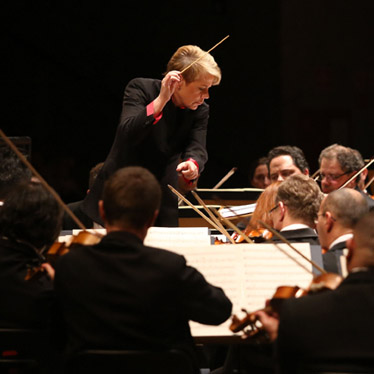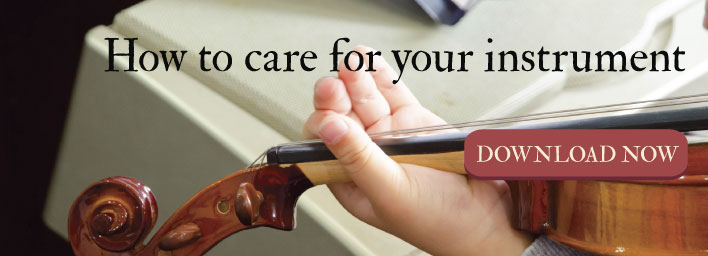
Like many professions, the world of conducting was once an exclusive boys club. Although it is still male-dominated – and many prominent figures in classical music are speaking out about the gender gap – more female conductors than ever are breaking through that glass ceiling. Over the past decade, programs have been established at conservatories around the world to help create a pipeline that puts the baton in the hands of more women.
Here’s a look at the top female conductors who are making history while lessening the gender disparity:
Marin Alsop
After earning the distinction in 2005 as the first conductor ever to receive a McArthur “genius grant” Fellowship, Alsop, 63, has several notable firsts on her resumé. A native New Yorker who went on to study under Leonard Bernstein at Tanglewood, Alsop was the first woman to conduct a major U.S. orchestra when she was hired as Music Director of the Baltimore Symphony Orchestra in 2007. Twice extended, she will remain with the BSO through 2021. In 2013, she made history again as the first female conductor to close out the BBC Proms concert series at the Royal Albert Hall. In late 2019 she took over as Chief Conductor of the ORF Vienna Radio Symphony. It’s the program’s 50th anniversary and Alsop is the first female to lead a Viennese orchestra.
Xian Zhang
Born in China in 1973 to a musically gifted family, Zhang took her first lessons with her mother on a piano her father crafted. Now the music director of the New Jersey Symphony Orchestra, her formal education included studies at the Central Conservatory of Music in Beijing. By age 19, Zhang made her debut as a conductor in a performance of The Marriage of Figaro with the China National Opera Orchestra. She later became conductor-in-residence of the China Opera House in Beijing and conductor of the Jinfan Symphony Orchestra. Zhang, who relocated to the U.S in 1998, was a periodic conductor for the New York Philharmonic (2002-2004) and in 2005 was appointed Associate Director of the orchestra. She recently committed to becoming the Principal Guest Conductor of the Melbourne Symphony.
Alice Farnham
A leading advocate for women in classical music, Farnham launched a three-week, girls-only class on conducting at Morley College in England, where she is in charge of the Opera School. Born and raised in England, where she started playing trumpet at age nine and piano training when she was 11, Farnham is the music director of the Welsh National Youth Opera and co-founder and Artistic Director of Women Conductors with the Royal Philharmonic Society. She was awarded an organ scholarship to St Hugh’s College Oxford and later studied under Ilya Musin in St. Petersburg, Russia, in the early 1990s. Conducting for nearly 20 years now, Farnham guest conducts with the Royal Opera. A leader of the National Concert Hall’s Female Conductor Programme in Ireland, she also mentors aspirants at the Dallas Opera’s Institute for Women Conductors.
Barbara Hannigan
Another strong voice for women and someone working to bring more gender versatility to conducting, Hannigan is one of 2019’s most celebrated artists. Hannigan is both an acclaimed conductor and sought-after soprano. A Principal Guest Conductor at the Gothenburg Symphony, she will soon be artist-in-residence at Orchestre Philharmonique de Radio France. A Canadian, Hannigan, 48, has conducted the Toronto Symphony Orchestra, as well as the Swedish Radio Symphony Orchestra and London Symphony Orchestra, among others. From 2018 to 2019, Hannigan was the Music Director of the Ojai Festival and artist-in-residence at the Aldeburgh Festival. In 2018, she hosted the first mentoring program for young musicians called Equilibrium Young Artists. The program continues to grow as Hannigan works in collaboration with the orchestras with which she has close ties.
Susanna Mälkki
Now entering her fifth season as Conductor of the Helsinki Philharmonic Orchestra, Mälkki grew up playing piano, violin, and cello before deciding to concentrate solely on cello. Born in Helsinki in 1969, Mälkki studied at the Royal Academy of Music in London, and later at the Sibelius Academy, where Jorma Panula instructed her in conducting. She was awarded first prize in the 1994 Turku National Cello Competition and enjoyed a performing career for the remainder of the decade, serving as principal cellist in the Gothenburg Symphony Orchestra. Turning her attention to conducting as the 2000s began, Mälkki made her debut with the Ensemble InterContemporain in 2004 and went on to be named EIC’s Music Director in 2006, a position she held until 2013.
Exploring a Career Path
Although only a small percentage of conductors are women heading into 2020, the success of these noted artists can only serve to encourage more females to consider joining their ranks. Classical music remains one of the most competitive fields for men or women hoping to launch a career. Becoming a conductor offers a path for classically trained musicians to make a good living doing something they love.
Top photo: Marin Alsop conducts at the Festival de Inverno de Campos do Jordão, São Paulo. Photo by Gilberto Marques, courtesy of wikicommons.
Sponsored by Thomastik-Infeld


